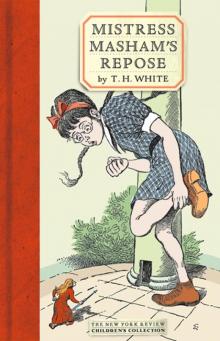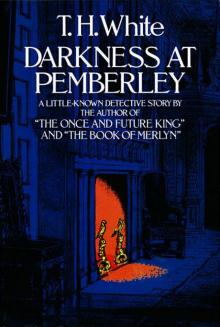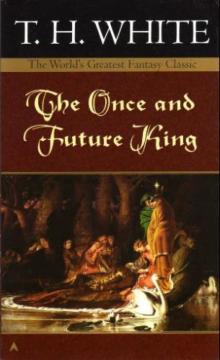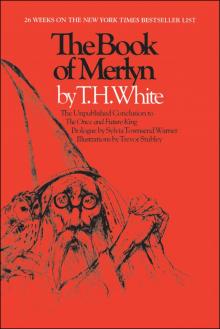- Home
- T. H. White
Darkness at Pemberley Page 8
Darkness at Pemberley Read online
Page 8
"That doesn't make it right for you to do it."
"Remember that if we don't do it he may murder your own brother, Miss Darcy, any day for the rest of his life."
"Even then, it's nothing to do with you. Chiz must do it himself. It's his funeral, not yours."
"A precious lot of good that is to anybody! So long as I'm privy to it I might as well be in at the death."
"That's a lie. You needn't be privy to it. You could always swear that you thought Chiz was joking."
"If Charles tries to do it alone there'll be another lot of death duties on Pemberley. He isn't safe with a pop-gun."
"Thank you," said Charles. "I'm going to find Mauleverer now, alone, to kill him with my bare hands."
He got up.
"Don't be a fool," said Buller. "This isn't a theatre. All this argument about who's going to kill him can wait. The first thing is to prevent him killing you. Let's search the house."
Charles consented out of politeness to his guest.
CHAPTER IX
The staff at Pemberley had diminished almost yearly since Charles's imprisonment, and nobody had troubled to engage new servants. All that could be assembled in the hall, including Charles, Elizabeth and Buller, was a party of sixteen. The gamekeeper, the cook, the boot-boy, and Smith the chauffeur, stood marshalled with the gardeners, grooms and maids under the dignified patronage of Kingdom's white moustache. Buller took command of the whole party.
The house was dealt with first. Each one of the innumerable rooms in its Georgian façade was entered in turn. The cupboards and hiding-places searched. Then the windows were fastened and the door shut and locked. Every room was thus secured, except the few bedrooms actually in use, three living-rooms, and the servants' quarters. Throughout the search Kingdom stood on guard in the big hall; the gamekeeper waited on the principal landing upstairs; and a maid stood on each of the two main staircases. Nothing was found, nothing stirred.
When the house had been combed thoroughly Kingdom was left to guard it and the party beat the grounds, posting sentries at favourable view-points in case the quarry should break back. Again nothing.
Buller had been walking with Elizabeth.
"All this searching," she asked, "does it mean that you think Mauleverer is in the house?"
"No. I don't think anything. All I know is that Mauleverer was on the stable roof this morning, or I'm a Dutchman. It's best to make sure he isn't in the castle before we pull up the drawbridge, so to speak."
*****
Meanwhile darkness had fallen. Kingdom had stood alone in the gathering dusk of the old house whilst the great hall sank about him imperceptibly through waves and waves of gloom. The invisibility welled up from the distant corners and sank downwards from the domed ceiling, gradually stealing its last glints from the chandelier. At last only the silent ghost of a white moustache hung suspended in the night.
Kingdom had made a mistake in not turning on the lights. The old man had lived at Pemberley all his life, and knew the house like his life itself. He was part of it, soaked in its feelings and not at enmity with its ghosts. He enjoyed its quiet dusk. All this locking of doors and the supposed danger of his master was at variance with the feeling of the house. He did not believe in it. There was no occasion for alarm, no need to live by electric light and peer in corners. Such things could not happen at Pemberley.
Upstairs the gloom was equally peaceful. Down the long corridors of the closed façade there was perfect silence and a faint smell of pot-pourri. In the oldest part of the house, at the back, where Charles's bedroom was, the darkness was deeper. Here the walls were panelled and the ceilings low, giving little purchase to the dying twilight. The locked doors were mute sentinels of darkness. Only in Charles's dressing-room there was a faint click, the rattle of a toothbrush against a glass. Then, to eyes accustomed to the darkness, a deeper darkness seemed to move across the room.
Kingdom was never able to give, to the end of his life, any account of the attack upon him—or no coherent account. He said that he had been standing silently in the middle of the hall, thinking about nothing, when a pair of white hands appeared before his face. There was a soft but unpleasant chuckle of laughter, and something cold was thrust between his fingers. He ran at once for the switch of the electric light and wheeled round as he snapped it on. There was nothing in the room. Only, on the floor where he had instinctively dropped it, was a white tooth-brush.
Kingdom opened the front door and shouted to the search party, which, on its way back, was already halfway up the drive.
Buller arrived at the double and asked what was up. When Kingdom had told him he swore softly and turned round to the others.
"We shall have to search the house again," he said. Then, turning back to Kingdom: "Was the front door open when you came to call us?"
"No, sir, it was locked on the inside."
"Go round to all the other doors on the ground floor and see if any of them are open, or could be opened from the outside without a key. And you, Smith, go round the outside of the house with a torch and see if any of the windows are open."
The search of the house was begun again. The villagers of Pemberley who could get a glimpse between the trees saw the whole house starting into light. Every window blazed uncurtained, from floor to roof, and the green lawns were rayed outwards with yellow beams. Inside the house, doors banged, keys turned in the locks and footsteps plodded along the passages. As each corridor was cleared the searchers called out to Buller on the main staircase. Kingdom came back from his inspection of the downstairs doors, and reported that they had all been locked and bolted. Shortly afterwards Smith came from his outside tour.
"All the downstairs windows were shut," he said. "But Sir Charles's window, and yours, sir, and Miss Elizabeth's, were open at the top."
Nobody was found in the house, and the doors were locked again as before. Charles took the keys.
Buller drew Charles and Elizabeth into the morning-room.
"Do you think Kingdom is prone to hallucinations," he asked Charles, "or are you going to believe me now?"
"It looks as if you were right," said Charles, "but why the toothbrush?"
"Why, indeed! Have a look at it."
Elizabeth exclaimed: "Why, that belongs to Chiz! Doesn't it, Chiz?"
"Yes," said her brother. "When we were looking through the rooms I found mine had gone. Why on earth?"
Buller said: "I'll send this to a friend of mine if you don't mind. The sooner we can get it done the better. I wonder if Smith could take it over to Cambridge in the car and be back before breakfast to-morrow?"
"Certainly, if it's important. Smith won't mind. He's a good fellow."
Smith was sent for, and set off without delay.
"Now," said Buller, "we've started in earnest. I'm going to sleep in your room, Charles, and we'll take it in turns, four hours at a stretch. You, Miss Darcy, must go and live in the village."
"I certainly shall not."
Buller became quite agitated.
"Now don't be heroic," he begged. "There's nothing to stay here for. It'll only make it worse for everybody——"
Elizabeth was quite final. "Of course I shan't go. I should be terrified in the village."
Buller was at a loss for reply.
"If I leave the house," she added reasonably, "I shan't know what's happening and I shall be scared into fits. I'm not in the least nervous whilst I'm here," she tried to say "with you" but it turned out as—"with everybody."
Buller said, "Well, you must lock your door and keep the window shut. This fellow's a cat burglar or a ghost. Either he got in by a second floor window to get the toothbrush, or he filtered through the wall. By the way, are there any secret passages or such like?"
"Not that I know of," said Charles. "I should think it was very unlikely. There's the priest's hole, of course, but you've seen that. It's now the little cupboard off the library."
"Have you any literature about the house?"
> "There's a bit in Blundell's Relicks and one or two county histories. It's not the sort of house that would have secret passages. All this part is very old, of course, much older than the front, which was done up in about 1750. But there aren't any legends to speak of, and it never was a priory. No secret entrances to the nuns' quarters half a mile away, or anything of that sort."
"Any ghosts?"
"I don't think so. It's a singularly peaceful house. We don't feel our ancestors at all, although some of them were a queer lot. They've died in all manner of ways here, but we never feel conscious of them."
"I don't see," said Elizabeth, "how Mauleverer could know about any secret passages if we don't know about them ourselves."
"Well, it's very unlikely I admit. But then you may not have studied the history of the house, and he may have done. He might have spent yesterday afternoon at the British Museum and turned something up which the family itself has quite forgotten. Still, it's unlikely. It's only in story-books that houses have secret passages."
Charles asked: "How on earth did the blighter get in an out again so quick, if he had to climb out of the bedroom windows? Shouldn't we have noticed him as we came up the drive? And Smith was sent round outside at once. How did he get away?"
"Don't ask me. It was possible to get in and out of those windows, I suppose. But he must be a very slick mover."
"The interesting part," said Elizabeth, "is the white hands. Why didn't Kingdom see a white face as well?"
*****
Before dinner Buller made a last attempt to persuade Elizabeth.
"Miss Darcy," he said, "won't you go away just for a week in case anything nasty crops up? I don't want to be unkind, but you can't possibly be useful, and wouldn't it be much better if you weren't here? I don't mean in case anything happens to Charles—if it happens, it doesn't matter where you are—but in case we get a chance of potting Mauleverer? I don't want you mixed up in a murder."
"No, I'm sorry: I absolutely couldn't go. I should be perfectly wretched. And besides, you know you can't try to kill Mauleverer even if you do catch him."
Buller said gruffly: "Well, if you can't go you must stay." In his heart he was delighted.
*****
They sat down to dinner amicably and were just dipping their spoons in the soup when Buller made an exclamation.
"No," he said. "Don't touch it. What a fool I am!"
The candlelight shone on two spoons half way to two open mouths, and four startled eyes looking at him over the rims.
"I'm sorry," he added. "It might be poisoned, you know."
The spoons descended slowly to the plates.
Charles suddenly exclaimed: "Damnation take it! This is the twentieth century. I'm to be locked up in my bedroom in my own house because a tile falls off the roof, and then I'm not allowed to have my dinner because my butler says he's been given a toothbrush! The soup can't be poisoned."
He seized his spoon, splashed his shirt-front and swallowed a vigorous mouthful.
"Well, we shall see now in any case," Buller said pacifically, and watched his host. Elizabeth tried to take some too, but he held her wrist firmly against the plate.
Charles began to splutter into his napkin and turned round furiously on the butler.
"Kingdom! What the devil is in this soup?"
"I couldn't say, I'm sure, sir. Cook made it as usual, I believe."
"What does it taste of?" enquired Buller. "If it's strychnine you'll have an agonising pain in about five minutes, and if it's a large dose of cyanide, your head will begin to curl over backwards till it touches your heels."
"Blast you! It's soap."
Charles began spitting in his napkin and frothing between oaths. Then he drank successive glasses of brandy, gin, lemonade, and anything else that appeared to have a taste. He sat down furiously and said:
"Well, what do we do now?"
"We might go on with dinner," said Buller. "Unless you want some more soup."
"I'm not going to have any more dinner. Ask cook to come up."
Mrs. Bossom arrived in a state of agitated indignation.
"I didn't put no soap in your soup, Master Charles," she said. "I've been in service in this house since ever you was born, and I never done such a thing!"
"Of course you didn't, cook," said Elizabeth. "Nobody thought so for a moment. But do you know who can have done it?"
"I made that soup," said Mrs. Bossom, "from the very best stock, such as I'm always using. There's nothing in that soup but what was in my kitchen all day, under my very nose; except when we was trapesing about a-looking for the burglar."
"I wonder if we could see the stock?" Buller asked.
When it was brought he tasted it, and asked the cook to do the same.
"Well, upon my word!" she exclaimed. "If some ruffian hasn't been putting soap in it!" She dredged about in the bowl with a spoon and brought up the remains of a cake of that commodity.
"Good," said Buller, "now we might as well go on with dinner?"
"But is it safe?"
"I should think so, perfectly. Unless there's cascara in the petits poussins. This is in the nature of a joke and a warning. If Mauleverer meant to poison us he wouldn't have given us the hint. I should think the rest of the meal would be perfectly harmless."
When Mrs. Bossom had retired grumbling to her den, Buller went on:
"This incident is rather a relief in one way. It may mean that Mauleverer doesn't wish to kill Charles by hole-and-corner methods. He's just saying: Look how easy it would have been to poison you, but I'm not going to do that, I'm going to get you properly, on the wing."
"I suppose he got into the kitchen whilst we were stumbling round the grounds. That's three places he visited: the kitchen, my bedroom and the Hall."
"Chiz," said Elizabeth, "this is awful. It didn't seem real before this. What a horrid joke! Why, it means we aren't safe anywhere, at any moment. If we sit down we may be sitting on a poisoned pin."
"Exactly," said Buller. "Now you begin to understand why I want you locked in your bedroom. No more meals downstairs, Charles, and, just as a precaution, we'll feed you on tinned foods from now on."
CHAPTER X
Immediately after dinner Charles, who was now ready to submit to Buller meekly, commandeered a parcel from the Times Book Club and announced that he was ready to be incarcerated. Buller had a word with Elizabeth before they went up.
"When you go to bed—and I wish you'd go now," he said, "lock your door and sleep with the window latched. It'll only be for a week. Don't open the door unless you're sure who is outside. Promise me to do this. There isn't any danger, but I like to know that everybody is acting according to schedule. Good night, Miss Darcy."
When she was gone he added to Charles: "I wonder if you realise that this scrape of yours may embroil your sister as well? It isn't only you that can drink soapy soup or sit on poisoned pins. And if I know Mauleverer, it's fifty-fifty whether he doesn't decide to get at you through her. He's the sort of man who might murder your whole household, one by one, saving you till the last."
"I'm sorry, Buller," said Charles stiffly, "that I've muddled you up in this annoyance. But after all you needn't stay."
Buller laughed. "I apologise," he said. "Don't get grumpy. I might be in love."
*****
Four hours later, just before two o'clock in the morning, Buller was sitting in Charles's dressing-room with the door into the bedroom standing open. He was reading Mr. Sponge's Sporting Tour.
There is an odd stillness and definition about the hours before sunrise, when the body is at its ebb. The electric light seemed to acquire a personality of its own, something aching and attentive; motionless, but imperceptibly stealthy and indued with sound and movement. The floor boards creaked under its watchful footfall. Charles's breathing from the next room sounded strange and irregular: the movement of a being removed from human thought by sleep.
The night life of things surrounded Buller in wideni
ng circles, focused upon his light. He was in the middle of the room, under the down beam of the lamp shade. Immediately about him was the green silence of the carpet, tired and ashy from his cigarettes. A wider circle of consciousness brought him to the inhuman patience of the clock, on his right, and to the weird breathing from the other room: equally inhuman.
Then, outside, was the silence and tangible darkness of the passage, leading, further off, to the hall's absorbing void, and to all the great and little deserted clocks of the household, ticking in separate persistence: unwatched, tenacious, uninforming. All the wainscots of all the rooms concerted about him in their stealthy rustle. The heart beat slower and slower. At tedious and regular intervals the brown hand moved mechanically up the right hand page and turned it over: the blue eyes flashed up, skirted the room, dwelt on the doorway and the clock: then they dropped to the left hand page and recommenced their timeless to-fro sidling.
A chapter ended like a cycle of ages, and the clock's hands stood at five past two. Buller shut the book with a startling noise, and stood up, breaking the charm. He went into the bedroom and shook Charles by the shoulder.
In Elizabeth's room the windows and doors were secured according to order. The curtains were drawn, so that the room was as dark as pitch. There was a faint smell of scent, the suggestion of feminine proximity. Otherwise nothing, except the softest regular breathing, and a gentle scraping from the dressing-table. The mirror creaked, ever so little, and a greasy surface squeaked against the glass.
In the absolute blackness an acute and trembling ear might have imagined that it detected a second ghostly breathing, a footstep upon wool.
*****
Buller rang for Kingdom to relieve him in Charles's room, and went downstairs to breakfast. The short but heavy sleep of the night had put him back into the mood of old campaigns, and, after a cold bath, he felt elastic and looked rosy.
Elizabeth was waiting for him.
"Come to see my room, would you?" she said. "I've got something to show you."

 The Once and Future King (#1-4)
The Once and Future King (#1-4) Once & Future King 05 - The Book of Merlyn
Once & Future King 05 - The Book of Merlyn Mistress Masham's Repose
Mistress Masham's Repose Darkness at Pemberley
Darkness at Pemberley The Once and Future King
The Once and Future King The Book of Merlyn
The Book of Merlyn Candle in the Wind
Candle in the Wind